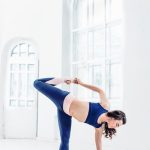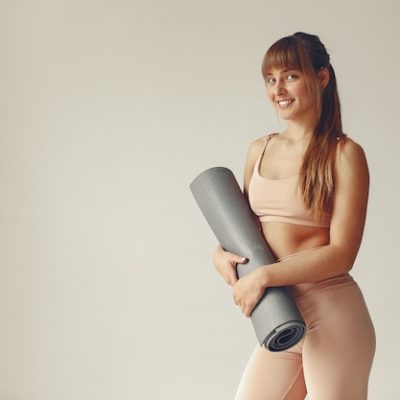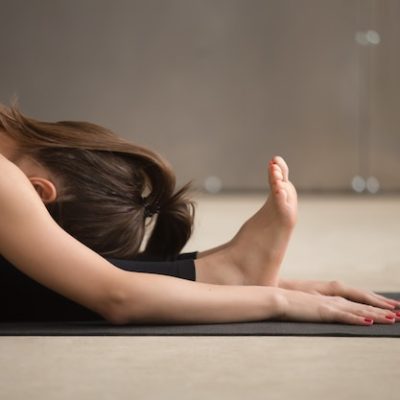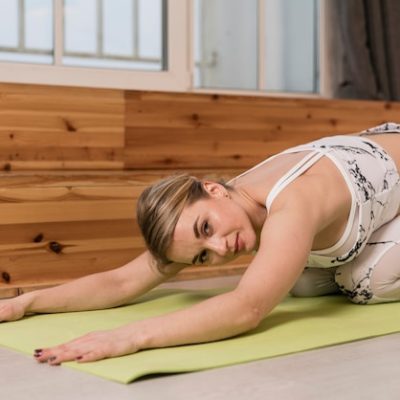Ever tried to hold a yoga pose and thought, “This just isn’t happening?” If so, Iyengar Yoga might be the solution you need.
This style is known for using props like blocks, straps, and chairs, which help you achieve proper alignment and enjoy the full benefits of yoga, regardless of your flexibility or strength.
Iyengar Yoga not only improves your ability to perform each pose but also ensures you do so safely and effectively. By emphasizing alignment and precision, it makes yoga accessible and beneficial for everyone.
Let’s explore how this method can cater to your unique needs and help you embrace yoga in a fresh way.
Iyengar Yoga, named after its founder B.K.S. Iyengar, is more than just another yoga style; it’s a precise method aimed at aligning and calming your body, mind, and spirit.
The practice focuses on precision and alignment in both postures and breath control. Here are the key principles that define this unique style:
This structured approach not only makes yoga more accessible but also ensures that everyone, from beginners to advanced practitioners, can safely and comprehensively experience its benefits.
The deep focus on posture and breath helps cultivate peace and clarity in the mind, making Iyengar Yoga a truly transformative practice.
If the idea of twisting into a yoga pose feels overwhelming due to physical challenges, Iyengar Yoga is here to change that perspective.
This style is celebrated for its inclusivity, making it a great option for individuals with varying abilities, including those recovering from injuries or managing chronic conditions. Here’s how Iyengar Yoga adapts to individual needs:
The innovative use of props in Iyengar Yoga is a game-changer for accessibility. Props like blocks, straps, chairs, and bolsters are essential tools that help modify poses.
For instance, if flexibility is an issue, a block can elevate the ground to meet your hand in a standing forward bend, reducing strain and promoting proper form.
Each prop is tailored to fit the practitioner’s current physical condition, allowing you to maintain the integrity of the poses while adjusting their intensity and depth to your comfort level.
These modifications ensure that you can practice yoga safely and effectively, respecting your body’s limits.
With the support of props, Iyengar Yoga allows you to hold poses longer without strain. This extended engagement deepens the benefits of each pose, improving circulation, enhancing respiratory capacity, and increasing muscle tone.
It also provides time for mental focus and meditative reflection, enhancing the therapeutic effects of your yoga practice.
Iyengar Yoga teachers are trained to focus on individual needs, making thoughtful adjustments to accommodate everyone in the class.
This personalized attention ensures that each participant can enjoy the benefits of yoga without the risk of injury.
By making yoga accessible, Iyengar Yoga also unlocks its mental and emotional benefits.
Participants often experience increased mental clarity and reduced anxiety, knowing they can practice yoga in a way that suits their body’s capabilities.
Through these methods, Iyengar Yoga breaks down barriers that might prevent someone from practicing, offering a pathway that is both adaptable and comprehensive.
It embodies the principle that yoga is for every body, regardless of age, condition, or ability level.
While often seen as a gentle form of yoga, Iyengar Yoga offers substantial benefits. This practice not only improves physical health but also provides significant mental and therapeutic advantages.
Iyengar Yoga enhances strength and stability, going beyond just flexibility. The practice includes various standing and seated poses that build muscular strength.
Each pose is held for longer periods, challenging your muscles and developing core strength, which is essential for overall stability and balance.
The focus on alignment and precise positioning improves physical balance and coordination, which is especially beneficial for older adults or those recovering from injuries who need to enhance their proprioception.
The slow, controlled movements of Iyengar Yoga require mental focus, helping to shift attention away from daily stressors.
Combined with deep, focused breathing, the practice promotes relaxation and stress relief, contributing to a more peaceful mental state.
Regular practice enhances concentration and mindfulness through sustained poses and breath awareness.
This increased mental clarity can positively impact daily life, improving decision-making and emotional stability.
One of the most significant benefits of Iyengar Yoga is its effectiveness as a form of physical therapy.
The precision in posture adjustments and the use of props make it particularly useful for managing chronic pain, such as back pain, arthritis, and other musculoskeletal issues.
It also aids in recovery from injuries and surgery, helping to speed up healing while minimizing the risk of re-injury.
Iyengar Yoga emphasizes breath control exercises, or pranayama. Practicing these techniques can improve lung capacity and efficiency, benefiting not just your yoga practice but your overall health.
Better breathing enhances blood circulation and energy levels, supporting bodily functions and improving health.
The combination of physical postures, breath work, and meditation in Iyengar Yoga addresses both body and mind.
This holistic approach can lead to improved overall health, including better digestion, enhanced immune response, and increased energy.
Incorporating Iyengar Yoga into your routine offers a comprehensive exercise system that provides much more than just the ability to touch your toes—it supports a healthier, more balanced lifestyle and a happier, more peaceful mind.
Are you ready to try Iyengar Yoga? This unique form of yoga can be a transformative experience, and starting off on the right foot is essential for enjoying and benefiting from the practice.
Here are some steps to help you begin your Iyengar Yoga journey:
Find a Certified Instructor: The first step is to find a certified instructor. Certified Iyengar Yoga teachers have undergone extensive training and are skilled in the art and science of yoga.
They understand body alignment and the correct use of props, which are crucial to the practice. A good instructor will ensure your alignment is precise and that you use props effectively, enhancing the safety and effectiveness of your practice.
Choosing the Right Class: When selecting a class, consider your current fitness level and any physical limitations. Iyengar Yoga classes are often offered at various levels, from beginner to advanced.
Starting with a beginner or introductory class can help you build a solid foundation in alignment, prop use, and posture sequencing.
What to Expect in Your First Class: Iyengar Yoga classes typically focus on precision and detail, with individual attention given to each student.
Expect a welcoming environment where the pace is slow to moderate, allowing ample time to adjust poses and learn the correct techniques.
Your instructor will likely use various props to assist with the poses, ensuring you can perform each one with proper form, regardless of your flexibility or strength.
Learning About Poses and Breath Connection: In Iyengar Yoga, you will learn not just how to perform various poses but also how to connect deeply with your body through breath control or pranayama.
This practice is as much about mental and spiritual health as it is about physical health. You will learn how to breathe correctly to maximize the effectiveness of each pose and to meditate on the breath, enhancing both your yoga practice and your ability to manage stress.
Progressing at Your Own Pace: One of the beautiful aspects of Iyengar Yoga is its adaptability to different body types and capabilities. Feel free to progress at your own pace.
As you become more familiar with the poses and the use of props, you will start to notice improvements in your alignment, strength, and flexibility.
Integrating Iyengar Yoga into Your Routine: As you continue with Iyengar Yoga, consider incorporating it more deeply into your daily or weekly routine. Regular practice is key to reaping the full benefits, such as increased flexibility, strength, mental clarity, and overall well-being.
Iyengar Yoga stands out as a uniquely adaptive and precise practice, perfectly suited for anyone looking to unlock the benefits of yoga in a secure and supportive environment.
Whether you are just starting or are an experienced yogi aiming to deepen your practice, Iyengar Yoga offers a well-structured path that fosters improvement in both body and mind.
The careful use of props and the focus on alignment and breath work ensure that each session is both accessible and challenging, regardless of your experience level.
This approach not only enhances physical health but also nurtures mental and emotional well-being, making it a holistic practice that supports and sustains your overall quality of life. You may find that Iyengar Yoga is the key to a healthier, more balanced lifestyle.
For additional resources and guided sessions, check out the Desa Yogi Iyengar Yoga channel on YouTube!










